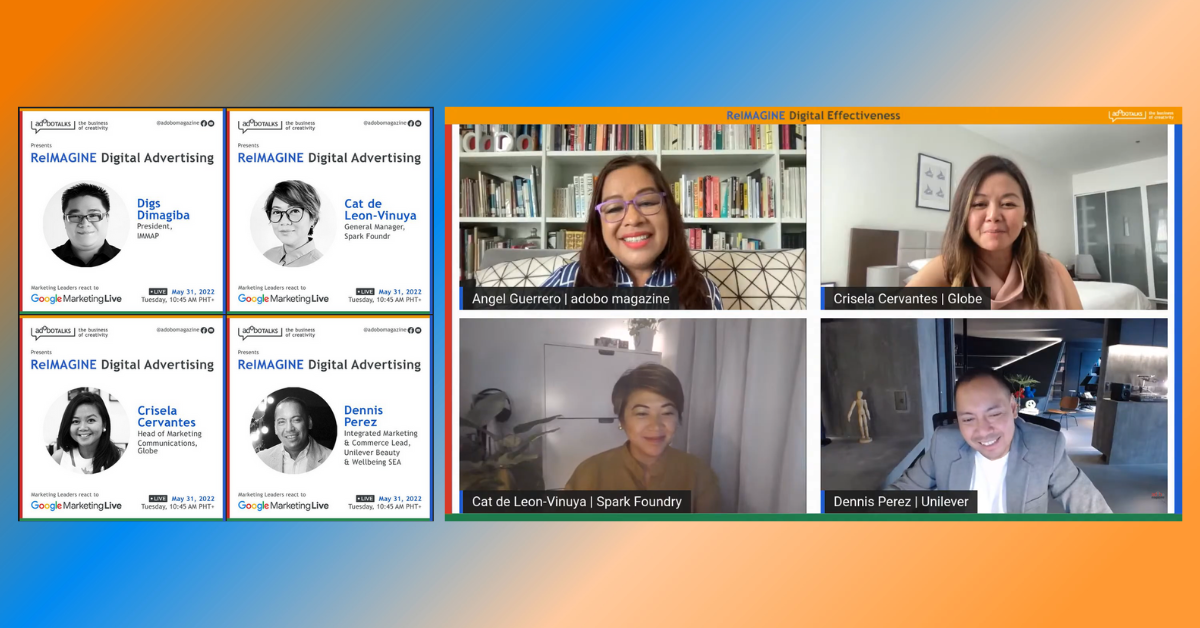Industry leaders shared personal insights on how Google is helping Filipino marketers drive effectiveness and win consumer trust in the digital age during a recently held panel organized by adobo Magazine for Google Marketing Live.
Most Important Currency: Trust
According to Digs Dimagiba, Chief Marketing Officer of Metrobank and President of the Internet and Mobile Marketing Association of the Philippines (IMMAP), in the era of data-driven marketing, trust is the most important currency.
Consumers now are “more conscious about who they’re going to trust” with their information. This is why getting this trust and providing consumers with transparency on how their data is being used should be at the forefront of any marketing campaign or product push.
“[We need to] go back to the fundamentals and respecting and treating the customer as an equal partner. In order to do great business and grow the industry, we need to create an ecosystem of trust…[with] privacy as the most important currency,” Dimagiba explained.
Trust is the heart of Google’s innovations. At the main Google Marketing Live online event, Scott Beaumont, President of Google Asia Pacific, said, “Even the most successful brands can only succeed when their customers trust them. And trust has to be earned. [At Google] we want to work with you to create privacy-safe digital marketing strategies, anchored in insights from your first-party data, given with people’s consent. Tools like Google Analytics for Firebase–our apps measurement solution–enable you to access those insights while upholding user privacy. They free you to focus on your unique strategic value — without worrying about the tactics. This is how we achieve responsible growth together.”
Right Tools for Optimizing Audiences
So much data is now available and within the databases of companies, the challenge for marketers now is to make use of this existing data “in a meaningful way for our business,” according to Crisela Cervantes, Head of Marketing Communications at Globe.
During its recent broadband campaign, Globe used Google’s Performance Max which allowed them to find more leads effectively and bring the cost per lead by 48%.
“Prior to this campaign, we relied heavily on existing targeting, which is more on interest and demographics. Using Performance Max, we found that we can really be more efficient if you leverage your first-party audience signals right. The opportunities are endless when it comes to data-driven marketing,” she added.
Similarly, personal care brand Dove embarked on a marketing campaign for its hair care line that uses the data that they already have about their market and activates it on a larger scale.
Through Google’s Code-optimized Designer Audiences (CODA), Dove was able to access insights and segmented data from Google that when combined with data the brand has was able to “unlock amazing results.” One of the biggest discoveries was the correlation between Dove buyers and those who buy air conditioners. This led Dove to target those searching for air conditioners to push their hair care products.
“When we did it…we were able to get around 70% higher [numbers] on both brand equity and sales,” said Dennis Perez, Integrated Marketing and Commerce Lead at Unilever Beauty and Wellbeing Southeast Asia. “Through CODA, we were able to reach double the size versus how we used to do broad-scale marketing. This shows that proper partnership is about understanding what data you have or what solutions you have. It’s all about combining data-driven marketing without sacrificing trust and privacy.”
Using YouTube to Drive Reach
Beyond using existing data, marketers also need to find a healthy mix of channels that will be able to reach their target audiences.
“It’s no secret that TV viewership is actually dipping even before the pandemic. In some audience segments to date, online has far surpassed TV consumption, moreso in the last 24 months,” according to Cat de Leon-Vinuya, General Manager of media agency Spark Foundry. “The younger audience is starting to get more and more elusive from the traditional channels, therefore TV may not necessarily be the right mix when it comes to trying to reach this audience. Hence, the scale now has to be tipped to explore different channels such as YouTube as a way for us to do incremental reach.”
With people consuming videos on multiple screens — all at the same time — video platforms such as YouTube bring in value when it comes to assisting TV campaigns as a mode of discovery, a means to educate, or put out more information about the product.
For the variety of brands handled by Spark Foundry that are trying to tap into the 18-25 years old age group, YouTube has always considered a spot-on part of their marketing mix. By doing so, they are able to effectively extract 50% incremental reach.
“Let us not put the Filipino in one box with 110 million people in it. Filipinos have so many facets and dimensions, and you can split that into a hundred boxes with a sizable amount of people–but you need to make sure that you give the content that really matches the audience that you’re talking to,” shared Dennis Perez of Unilever.
Watch the panel in its entirety via adobo magazine’s YouTube channel.


